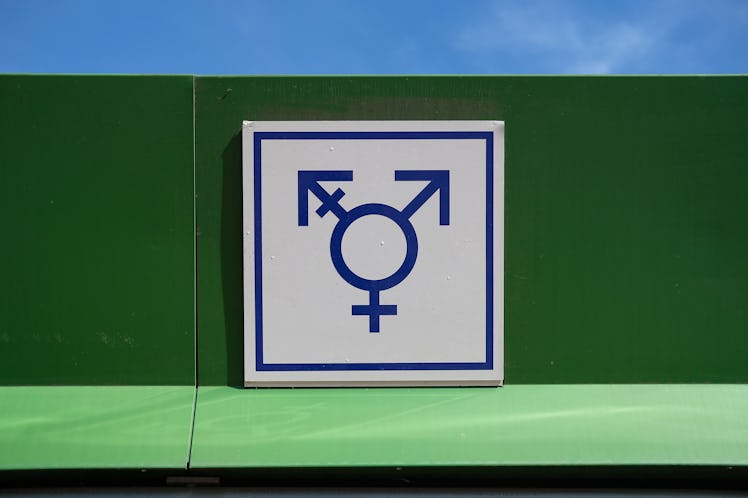
This State's Ballot Initiative Could Have A Major Effect On Trans Rights
On Nov. 6, voters around the country will take to the polls to elect not just their representatives, but also to weigh in on some important measures. For example, in Massachusetts, a transgender rights ballot measure in the 2018 midterms will be up to the voters to decide. Voters will see a question on their ballots that asks if they approve a state law that bars discrimination on the basis of gender identity — and gives Massachusetts residents the power to roll it back. So, what is Massachusetts ballot Question 3? This could have some major implications for trans rights.
The question, which is the nation's first statewide referendum on transgender rights, asks for a "yes" or "no" vote to repeal a law approved in 2016 that prevents discrimination against transgender people in places of public accommodation. A "yes" vote will keep the current law in place and protect individuals from discrimination based on gender identity. Conversely, a "no" vote will repeal this provision of the law, and gender identity will no longer be included in the list of prohibited grounds for discrimination, which includes race, color, religious creed, national origin, sex, disability, and ancestry. The law is all the more important because there is no federal law explicitly prohibiting discrimination against trans individuals, and the Justice Department under President Donald Trump recently argued that trans people are not protected under current anti-discrimination laws.
Opponents of the 2016 law, like Keep MA Safe, the group sponsoring the referendum vote, and the Massachusetts Family Institute argue that if this law were to remain, there would be an increase in misconduct against women in locker rooms and public restrooms. However, advocacy group Freedom For All Massachusetts, which is sponsoring the campaign for a "yes" vote, notes that "the 18 states and more than 200 municipalities with laws protecting transgender people from discrimination have reported no problems."
Professor Kim Forde-Mazrui at the University of Virginia School of Law, who specializes in gay rights and equal protection, explained to Elite Daily that the definition of "public accommodations" goes beyond the bathrooms and locker rooms cited by advocates of repeal, and can actually include hotels, restaurants, libraries, public transportation, and other businesses open to the public. A "no" vote on Question 3 would undermine basic protections in such spaces for transgender people in the state of Massachusetts, he says.
Forde-Mazrui noted that pushback to anti-discrimination laws is a backlash to increasing legal protection for minority groups.
"You have a lot of jurisdictions, especially local jurisdictions, that have been passing laws that expressly protect gender identity from discrimination," he says. "That is generating a backlash by conservatives who feel threatened by the protections." He notes that opponents frequently "try to pass laws that either just repeal protections that have been created or even forbid them for being enacted in the future."
"We saw [this] in North Carolina," he notes. The state famously enacted the so-called "bathroom bill," which required people to use the bathroom corresponding with the gender listed on their birth certificate. The bill — officially called HB2 — also prohibited local governments from enacting their own anti-discrimination measures. "Charlotte had protections for transgender people," Forde-Mazrui says, "and the state legislature passed a law that repealed it and said 'you just can't adopt these kinds of protections.'"
Several people and groups in Massachusetts are rallying behind a "yes" vote on Question 3, including women's organizations, faith leaders, city mayors, educators, labor unions, and sports teams like the Patriots and the Red Sox. Various celebrities have also encouraged a "yes" on 3 vote, including Queer Eye's Jonathan Van Ness, who shared his thoughts on the law with Elite Daily while wearing nail polish that said "Vote Yes On 3."
"Yes on 3 is like, 'yes on your rights, yes on your rights!" Van Ness tells Elite Daily in an interview. "It’s basically a blueprint for other fringe, right wing places in other state legislatures to come for people." He says that the law that the ballot measure would repeal is currently "protecting trans people’s rights to public spaces, basically to exist in public spaces that we take for granted all the time as cis[gender] people."
If Massachusetts voters act to appeal the protections, there are still actions that advocates and allies can take, according to Forde-Mazrui.
"There are both political and legal strategies," Professor Forde-Mazrui said. "Political strategies would be to keep advocating for laws like the one passed in 2016, including ballot measures down the road that could review it." He adds that it's very much a political issue. "Don't give up on the political front." On the legal side of things, he noted that there are indications that courts are getting more and more willing to recognize transgender rights. For example, in May, a federal court ruled in favor of a trans student who sued his school for denying him access to the boys' bathroom.
Voting will happen in Massachusetts on Tuesday, Nov. 6. What happens after the polls close, we'll have to wait and see.